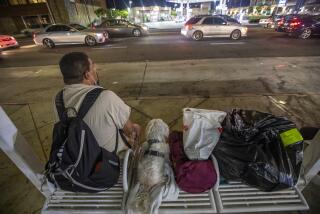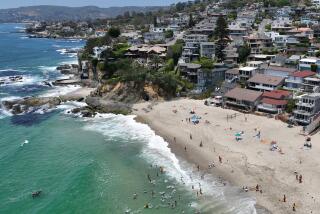Huntington Beach Police Redeployed in Effort to Cut Overtime Costs
HUNTINGTON BEACH — City officials say they plan to scale back the numbers of police officers assigned to gang enforcement and other special units this summer in an effort to curb nearly $900,000 in excess overtime spending.
Police officials say the move means a reduction of special details at the beach and downtown, but overall will put more patrol officers on the street citywide--and will not spell any cutback in police deployment on the Fourth of July, typically the busiest enforcement day of the year in the beach city.
The changes, which city officials say are needed because of budget problems, have left resident Loretta Wolfe fearing the worst: that crime will increase and people won’t feel safe in their homes.
“I feel very strong that their presence has to be felt down here 365 days a year,” said Wolfe, co-chairwoman of the Downtown Residents’ Assn. “If police can’t be seen, things happen. There are some wacky individuals that come to this town.”
City Administrator Michael T. Uberuaga said he mandated that the department shift its deployment in an effort to avoid $874,000 in extra overtime for the city’s budget year, which ends in October. The city already had budgeted about $1.9 million of the department’s $31.8-million budget for overtime expenses, and much of the overtime budget already has been spent.
The cutbacks mean that 20 officers working special details--targeting such areas as gangs and drunk drivers and summertime revelers--will be reassigned to patrol to handle radio calls.
“We’re a beach city. Our busiest times of the year are June, July and September,” said Police Lt. Dan Johnson. “We have always taken officers out of patrol and put them on the beach and downtown area and then we have to fill patrol openings with overtime. We’re not going to be allowed to do that this year.”
Johnson said the department has run through overtime money primarily because of personnel shortages. He said there are 233 budgeted sworn officers, but due to officers away on injury and family leaves, as well as vacancies, the department has 223 officers available to work.
He said the shift will mean:
* Cutting the summer beach detail by one officer, leaving a seven-member unit plus a sergeant, and eliminating overtime for drunk driving enforcement.
* Hiring four--instead of eight--civilians to issue beach citations, for alcohol consumption and other offenses.
* Reducing the number of officers on foot patrols downtown from six to four, the normal winter deployment.
* Eliminating downtown checkpoints for sobriety, curfew and cruising violations.
Johnson also said the redeployment to patrol will also include the three school resource officers normally sent downtown, along with two gang officers and three detectives. He predicted the 10% cut in the detective bureau would result in a case backlog.
Councilman Ralph H. Bauer said the city has no choice but to limit overtime. “We can’t keep dipping into reserves. We have to take whatever measures to keep the budget in line,” he said.
Bauer said the redeployment won’t decrease police protection on a daily basis. “The major deterrent to crime is patrol on the streets: having police cars and police highly visible. I understand that the proposal will assure that that visibility will continue.”
Courtney Mayden, assistant manager of Starbucks Coffee on Main Street, worried that if people know the police are cutting back, “It sort of gives them a free ticket” to commit crime.
“The beach is very busy during the summertime, and it just seems like it’s not a good idea to have fewer police officers around,” she said.
Other merchants also said the situation is a Catch-22. The city is reducing the number of hours worked by police officers because there’s not enough money. But if crime increases, the city will have even less money.
“If the town is safe, we’ll have the tourists,” said Sharon Andriet, manager of downtown’s Huntington Beach Beer Co. “That’s how we survive here. We have to make sure the town is clean and safe and attractive so that people will want to come here. If they stop coming because it’s no longer safe, we’re all in trouble.”
Police Lt. Jon Arnold said that, despite the change in deployment, enforcement of city laws, including curfew checks, will continue.
“We’re confident we can still deal with any of the challenges at the beach or activity downtown using the resources available,” Arnold said. “It’s easier to do with additional resources, but we don’t have that luxury right now.”
More to Read
Sign up for Essential California
The most important California stories and recommendations in your inbox every morning.
You may occasionally receive promotional content from the Los Angeles Times.










